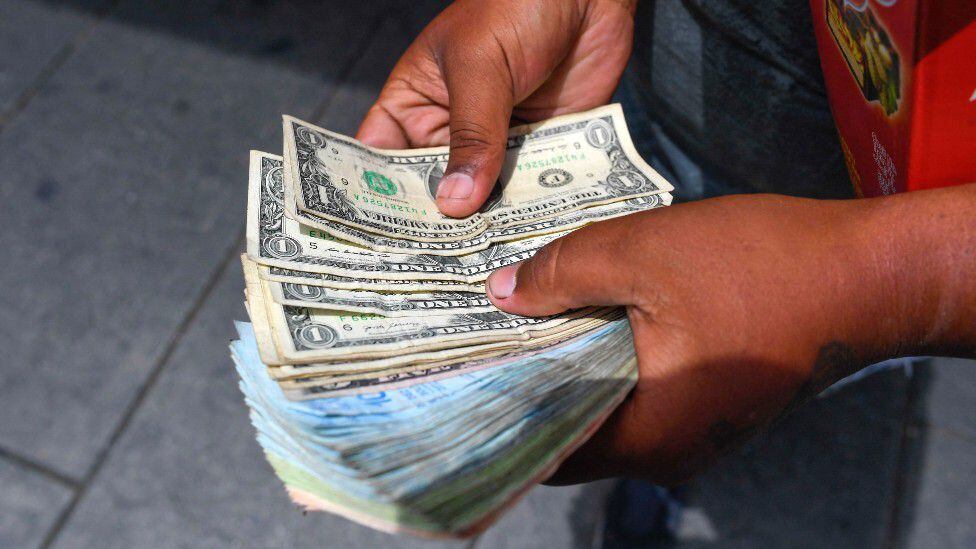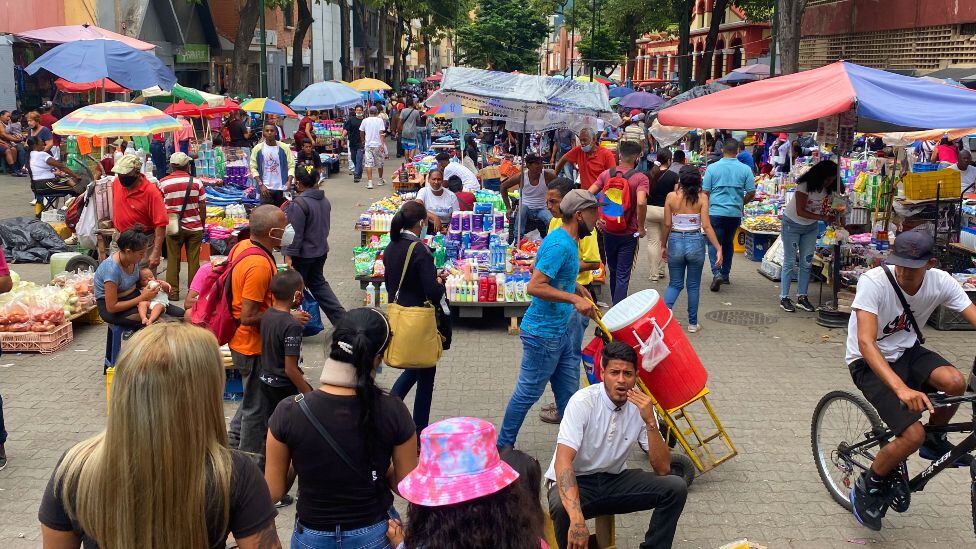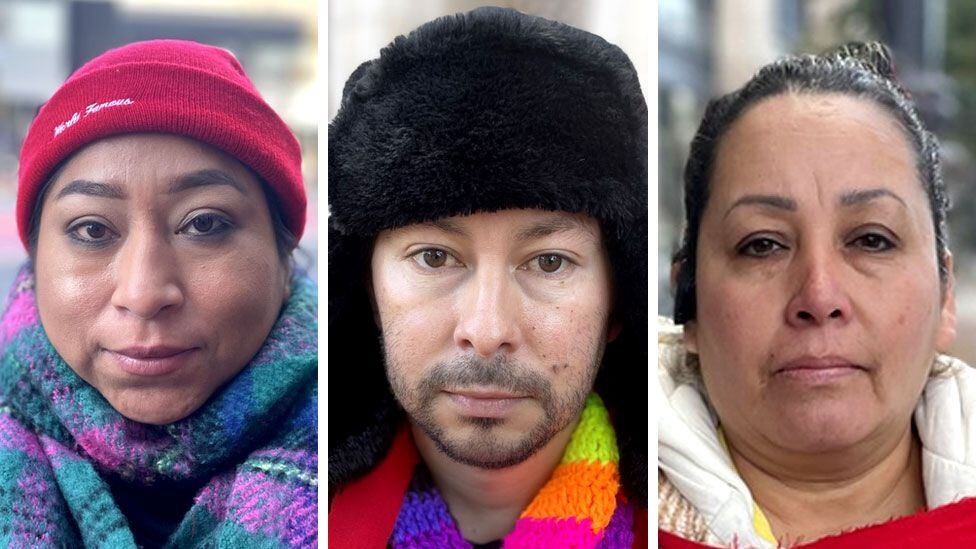Whenever one goes to Venezuela He asks people there if they need anything.
So when less than a month ago I asked Rada, my driver and Venezuelan adoptive father, what he wanted, he told me that a chocolate.
SIGHT: “Venezuela is the most colorful country in South America”: Russian tourists visiting the idyllic island of Margarita
I brought him his favorite: a Hershey’s of cookies ‘n’ creme, a product that he met on his trips to Margarita Island, back in the 90s, when he was earning enough as a courier to go on vacation to one of the Venezuelan paradises.
Already in Caracas, however, I realized that my question could have been anachronistic: the famous American chocolate bar is easily available.
- PAHO requires 3 doses of Chinese Sinovac to consider fully vaccinated people over 60 years of age
- How is the new tower of the iconic Sagrada Familia, the basilica that has been under construction for 140 years
- The country that has only vaccinated 3% of its population and will destroy a million doses
But for Rada, who receives a pension of US $ 5 a month, chocolate remains, as he puts it, “unattainable”: it costs between $ 1 and $ 2, double what I paid in Bogotá.
It was there when I understood that the Venezuela where I lived between 2013 and 2017, full of queues to buy subsidized basic products, is no longer the same: scarcity and price controls are gone and the most frequently used currency – in the country of anti-imperialism – is the dollar: old and bruised $ 1, 5 and 10 bills that have generated a small economic boom.
And the Hershey’s are achieved, but people like Rada, who are the vast majority, still cannot access the basics, much less what they want. The life of the Venezuelan went from being an odyssey to get a bag of flour —with which they make the essential arepas— to another to earn a few extra dollars.
Popular neighborhoods like Catia and Petare, in Caracas, have been lined with informal vendors. “Peddlers,” they say. People earn more money by offering used food, parts, and appliances than by working in a formal business. The search and the second and third jobs – what here they call “tigritos” – have skyrocketed like inflation and proliferated like dollars.
Before, the majority of Venezuelans could not get the products and now, which are abundant, they cannot afford them. So they work twice as hard, and whatever there is.
“Overcome polarization”
The stores where you can get Hershey’s are called “still lifes.” There are body creams, almond butter, artichoke pickles. They are like centers of worship for sumptuous products.
But the boom is not just about still lifes.
Across the country, for example, they have opened 30 casinos. Hugo Chávez had banned them in the past, considering them “dens” that “only benefit the bourgeoisie”.
And in Chacao, a commercial neighborhood and opposition stronghold, they have just opened an establishment that its promoters inaugurated as “the Caracas we dream of.” It’s called Mode. It looks like a food court, but luxurious. It is like a small evocation of the old Venezuela of ostentation; an imprint of the Fourth Republic, of the times before Chávez, but in the age of Instagram.
Mode has four tracks of bowling, five bars, three restaurants, an ice cream parlor, a nursery for children, a state-of-the-art wood-fired oven, and a design store that sells works of art for up to US $ 3,000.

“Look, I’m from the radical opposition and, I’m honest, I don’t know where the real ones come from for this,” a diner told me to whom I asked the obvious question: who has so much money – probably millions of dollars – to pay for this investment.
The young man continued: “This (Mode) is something that we Caracas needed; it was so many years without life, without nights out, without cultural offer (…) This is a space to unite, to overcome the polarization that caused so much damage to us”.
Five years ago you couldn’t spend a day without talking about politics in Caracas. The proselytizing posters in the street gave the idea of a permanent electoral campaign. Families with people from both sides did not speak to each other. Politics was everyday.
But that ended. Apathy, after years of frustrations and economic crisis, has taken hold of the majority who want political change. Now people not only abstain from voting, as seen in the recent regional elections, but even prefer to omit the issue.

Inequality
In spaces like Modo, the humanitarian crisis that we reported five years ago seems like a memory of the past. But it is not: according to the latest National Survey of Living Conditions, from the Catholic University, 95% of Venezuelans are poor, 70% are in extreme poverty and inequality is more acute than in Colombia and Brazil, both most inequitable countries in the world.
In a nation that once had a consolidated middle class, today inequality is on every corner. It happened to me in a restaurant that the waiters were talking about the 10 or 15 dollars they earned in a “trigrito” at the same time that at the next table I heard businessmen boasting about their investments of US $ 100,000.
While in popular neighborhoods hairdressers set up informal seats with cracked mirrors to earn US $ 2 per cut during the weekend, in affluent sectors they have opened barber shops with a bar and pool table where hairdressing is worth US $ 20 “with a complimentary massage and drink “included.
De facto dollarization has generated growth, some jobs, alleviated shortages and eased pressure on the government. But none of the economists I spoke to were optimistic.

It has been an informal, anarchic process. These millionaire investments are not generating taxes for the State, and ownership of them is uncertain. Notaries cannot authenticate dollar contracts. Banks cannot give credit.
It’s not even clear where the bills come from. Given the enmity of Caracas and Washington, it is impossible for the money supply to be sent by the United States Federal Reserve. Perhaps the tickets come from the remittances sent by the nearly six million emigrants to their families; Perhaps they come from oil that, according to specialized reports, the sanctioned Venezuela must sell for cash to informal buyers.
Dollarization, experts explain, cannot solve problems that concern the State, such as water, electricity or gas services, which are still deficient. And pensions and subsidies, when paid in bolivars – the devalued official currency – do not have the capacity to assist the poorest.
Many say here that “Venezuela went from socialism to savage capitalism”, but even the harshest capitalism has some regulation. Here, the government that supervised the entire economy eradicated controls, opened ports, dissolved taxes. Many imports do not go through official customs control.
That is why, instead of savage capitalism, experts like Benedicte Bull, Antulio Rosales and Manuel Sutherland describe it in a recent report as “still life capitalism“in reference to the stores that symbolize the renewed import economy amid deep opacity.
In just three years, one of the largest states in Latin America, the Venezuelan petro-state, went from being omnipresent to almost irrelevant; it maintains subsidies and social missions, but in bolivars; He is an employer of three million people who earn no more than US $ 10 and pays pensions that are not enough for more than three chocolates.
My friend Rada may no longer need me to bring him scarce products. What you need is that your pension is enough to buy them.
______________________________
- Next pandemic could be “worse or deadlier,” warns Oxford / AstraZeneca vaccine creator
- How the new Super Green Pass complicates social life for the unvaccinated in Italy
- Flight MH370: can one of the great mysteries of aviation finally be solved?
- Plumber finds money hidden in the wall of a megachurch (and could have solved a mysterious robbery from 2014)
- They find dead a young Brazilian woman who was missing and who was forced to dig her own grave
- US Congressman Releases Christmas Family Photo With Guns, Days After School Shooting
.

:quality(75)/cloudfront-us-east-1.images.arcpublishing.com/elcomercio/GIYTCMZNGEZC2MBZKQYDAORSGE.jpg)

:quality(75)/cloudfront-us-east-1.images.arcpublishing.com/elcomercio/4UPJ7IRCFJBTHBFZWNQOHACRVE.jpg)


:quality(75)/cloudfront-us-east-1.images.arcpublishing.com/elcomercio/AYPHYGNDCVAIVCMISJCVBF3X6I.jpg)
